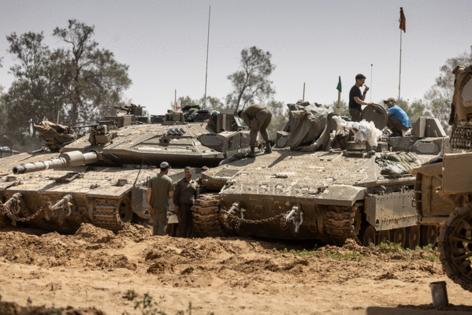Israel prepares to scale up pressure on Gaza ahead of Trump visit
Published in News & Features
Israel’s security cabinet was set to meet on Sunday to approve an expansion of military action in Gaza and discuss aid deliveries ahead of a planned visit to the Middle East this month by President Donald Trump.
The new ground operations will likely involve taking control of additional territory while stopping short of a full siege, according to two Israeli officials who spoke on condition on anonymity on matters they were not authorized to speak publicly.
Over the past 50 days, since a temporary truce ended, Israel has repeatedly threatened to escalate until Hamas agrees to release remaining hostages held since October 2023. The Israel Defense Forces have since taken taken over about a third of the Palestinian territory and completely cut off humanitarian aid.
Thousands of Israeli reserve soldiers received call-up notices ahead of tonight’s security cabinet meeting, an IDF official said Sunday.
Trump currently isn’t expected to visit Israel in a visit to the region at mid-month, but will instead focus on Qatar — a key mediator between Israel and Hamas — as well as Saudi Arabia and the UAE. U.S. Secretary of Defense Pete Hegseth will visit the Jewish state ahead of the presidential tour and meet with Israeli Prime Minister Benjamin Netanyahu, Axios reported Sunday.
The high-profile visits could signal a renewed U.S. focus on Gaza and the broader region after several weeks in which the Trump administration’s attention has been diverted to nuclear talks with Iran and efforts to forge a ceasefire between Russia and Ukraine.
There’s no clarity on whether Trump will prioritize the Gaza conflict in his regional talks. However, steps toward a ceasefire accord would serve the declared goal of promoting regional stability.
Trump is expected to discuss arms sales to Riyadh, which the U.S. views as a key player in a broad, U.S.-backed regional alliance that was formerly planned to include Israel.
Saudi Arabia was on the cusp of normalizing ties with Israel but has cooled down since the war started, demanding an end to hostilities first.
Israel’s government sees its latest Gaza operation, including the increase in manpower, combined with U.S. pressure on regional players ahead of Trump’s visit, as potentially forcing Hamas to fold and perhaps improving the chances of reaching a ceasefire, said one of the officials.
Yet gaps between the stated positions of Israel and Hamas remain large.
Ceasefire talks have been at stalemate for weeks, with Hamas refusing to discuss further release of hostages – 59 of whom are still in held in captivity, including 24 thought to be alive – unless Israel agrees to end the war and pull its forces out of Gaza.
A Hamas official told Bloomberg last week that the organization will not accept Israel’s demands to disarm and remove its leaders from Gaza. Netanyahu, in turn, blamed Hamas for “remaining an obstacle” in the face of a potential deal, and said that destroying Hamas remains Israel’s ultimate war goal.
Aid distribution
Netanyahu’s government on Sunday was also expected to discuss a new mechanism for aid distribution. It’s likely to involve non-Israeli private companies distributing goods to the population in a designated humanitarian zone at Gaza’s south, said one of the officials. The entire zone will be controlled by the Israeli military, the official added, making it impossible for Hamas to seize the goods.
Israel has long argued that Hamas’s access to aid distribution channels has been the main reason for its survival in Gaza, by providing it with income and a way to maintain control over the population.
The plans to intensify operations in Gaza come as at least two other fronts are flaring up for Israel.
On Sunday, a Houthi missile hit an area close its main Ben Gurion airport, causing international air carriers to halt flights for a few days.
Netanyahu’s government over the weekend also launched a series of targeted attacks against Syria’s new leader, Ahmed Al-Shaara, following violent clashes between the Druze minority group and Syrian government forces that left at least 70 people dead.
The attacks were an extension of a wider offensive in Syria since the overthrow of long-time President Bashar Al-Assad in December. That’s part of a shift in Israeli defense policy to one of more aggression beyond the country’s borders, following the October 2023 attacks by Hamas that triggered the war in Gaza.
_____
(With assistance from Fares Akram.)
_____
©2025 Bloomberg L.P. Visit bloomberg.com. Distributed by Tribune Content Agency, LLC.







Comments